'It's about educating everybody': Nipissing First Nation on residential school history
Friday morning, Judy Couchie stood in the middle of a drum circle at Nbisiing Secondary School on Nipissing First Nation, near North Bay, visibly choked up.
She had just finished sharing her deeply personal experience as a residential school survivor with the crowd gathered in the school's gym.
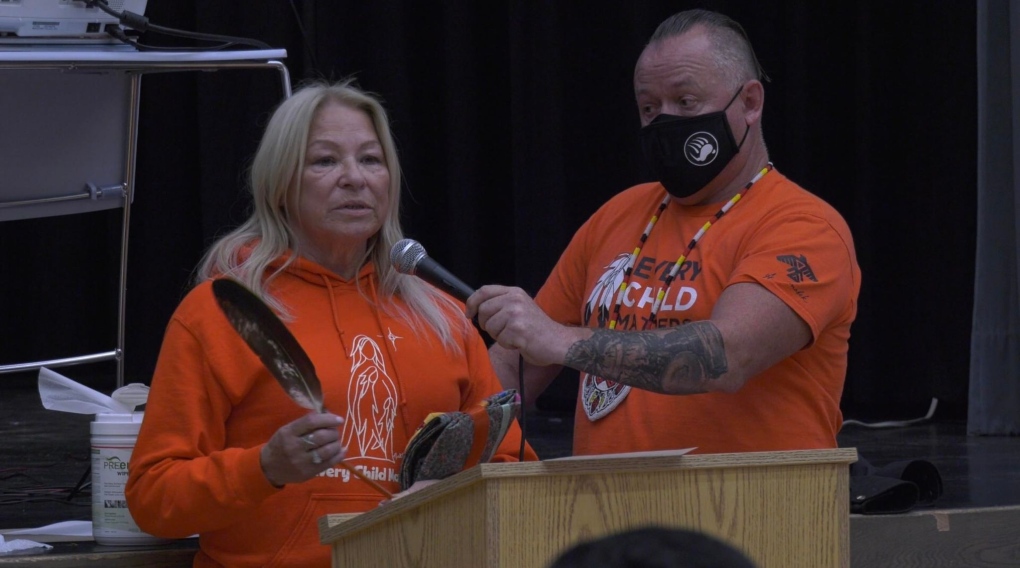 Judy Couchie (left), a residential school survivor, shares her experience with a crowd at Nbissing Secondary School on Nipissing First Nation on National Day for Truth and Reconciliation as Chief Scott McLeod (right) holds the microphone. Sept. 30/22 (Eric Taschner/CTV Northern Ontario)
Judy Couchie (left), a residential school survivor, shares her experience with a crowd at Nbissing Secondary School on Nipissing First Nation on National Day for Truth and Reconciliation as Chief Scott McLeod (right) holds the microphone. Sept. 30/22 (Eric Taschner/CTV Northern Ontario)
Young girls and women sang and played the drum for her as she reflected on the experience she has lived through.
"With finding the 215+, it's disheartening to me," Couchie said, referring to the bodies of children found buried in unmarked graves at various Canadian residential schools across the country.
"I want to see them all go home."
The northeastern Ontario Indigenous community and its allies gathered at the school on National Day for Truth and Reconciliation for a ceremony and walk to the local residential school monument.
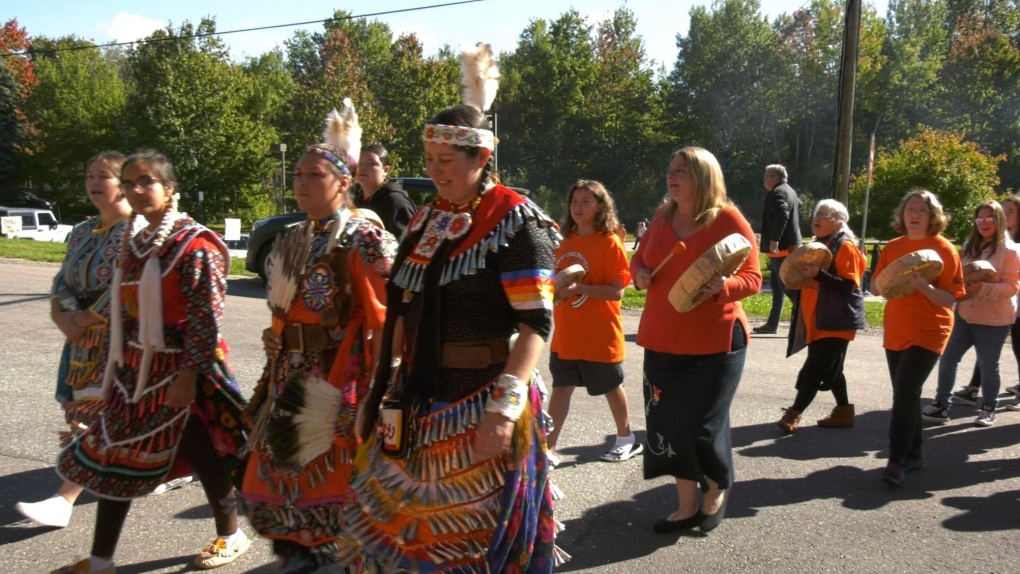 Group marches from Nbisiing Secondary School to Nipissing First Nation's residential school monument on the National Day for Truth and Reconciliation. Sept. 30/22 (Eric Taschner/CTV Northern Ontario)
Group marches from Nbisiing Secondary School to Nipissing First Nation's residential school monument on the National Day for Truth and Reconciliation. Sept. 30/22 (Eric Taschner/CTV Northern Ontario)
As Couchie told her story to the crowd, tears trickled down her cheeks.
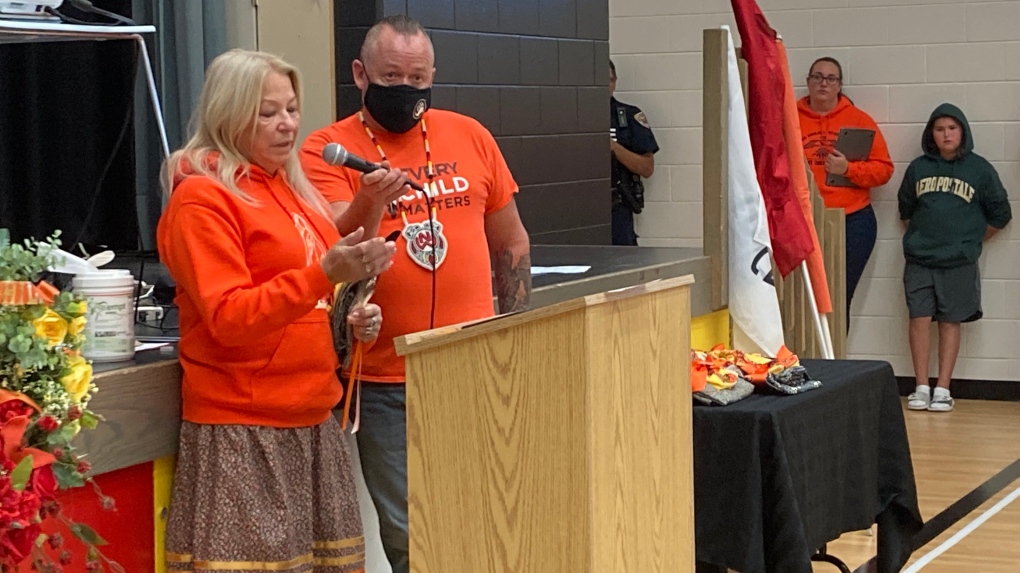 Residential school survivor Judy Couchie shares her story at Nbisiing Secondary School on Nipissing First Nation for National Day for Truth and Reconciliation. Sept. 30/22 (Eric Taschner/CTV Northern Ontario)
Residential school survivor Judy Couchie shares her story at Nbisiing Secondary School on Nipissing First Nation for National Day for Truth and Reconciliation. Sept. 30/22 (Eric Taschner/CTV Northern Ontario)
She was sent to Shingwauk Residential School in Sault Ste. Marie in her pre-teen years, she said. The school closed in 1970.
Couchie describes it as a horrific place where young kids were treated inhumanely just because they were First Nation.
"It was a lonely time. Very lonely for a child to spend," she said.
"You heard the children cry at night. That's when I learned of discrimination."
On Friday, Couchie and hundreds of others, including children, marched from the local high school to the monument, where she laid an 'Every Child Matters' wreath on behalf of all victims and survivors.
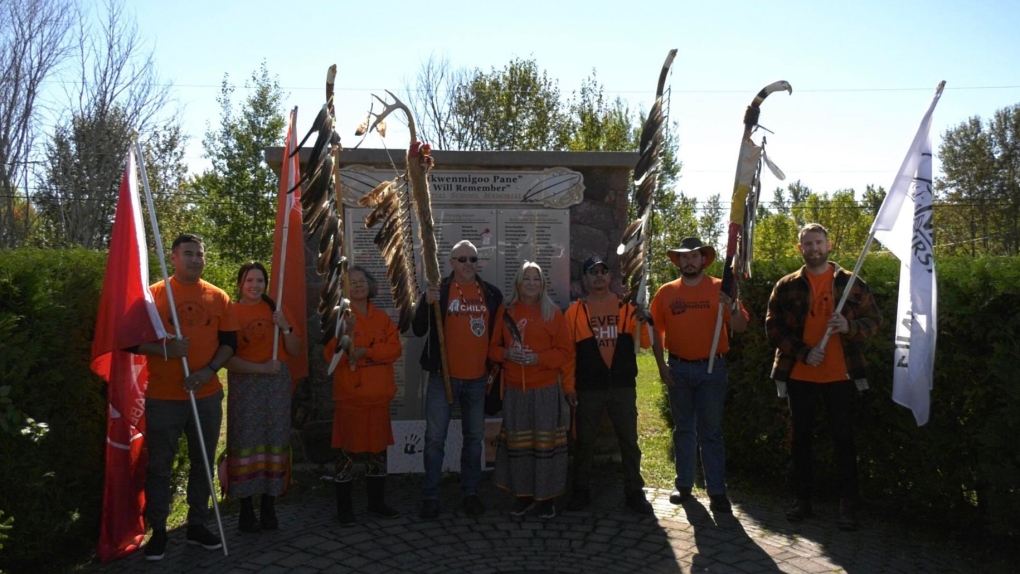 Gathering at Nipissing First Nation residential school monument on the National Day for Truth and Reconciliation. Sept. 30/22 (Eric Taschner/CTV Northern Ontario)
Gathering at Nipissing First Nation residential school monument on the National Day for Truth and Reconciliation. Sept. 30/22 (Eric Taschner/CTV Northern Ontario)
Data shows 127 Nipissing First Nation children were ripped from their families and forced into the residential school system, Chief Scott McLeod told CTV News.
Most of them were sent to a residential school in Spanish, Ont., west of Sudbury, which closed in 1962.
Today, 60 years later, only eight survivors remain alive.
"The general public has not been aware of residential schools systems since recently," McLeod said.
"But, you cannot tell me that Pierre Elliot Trudeau and all the prime ministers, even his son Justin Trudeau, did not know."
There's pain, trauma and sadness, but also a celebration of a culture that remains vibrant and strong in the area.
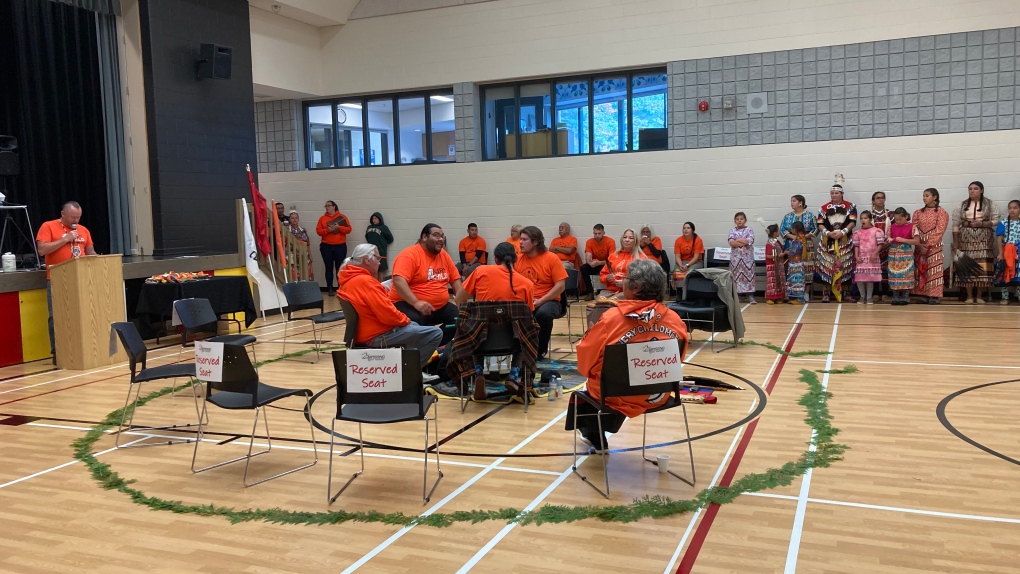 National Day of Truth and Reconciliation gathering at Nbisiing Secondary School on Nipissing First Nation. Sept. 30/22 (Eric Taschner/CTV Northern Ontario)
National Day of Truth and Reconciliation gathering at Nbisiing Secondary School on Nipissing First Nation. Sept. 30/22 (Eric Taschner/CTV Northern Ontario)
McLeod said it's easy to acknowledge the truth of residential schools, but reconciliation comes with changing how First Nation Peoples are treated through laws and legislation.
"If you look at the 94 calls to action that came out of the Truth and Reconciliation Commission, only one in 10 of those calls to action have been implemented," the chief said.
"So there's still lots of work to be done. We need to keep pressure on the government. It's the only way change will happen."
A powerful statement that many said needs to be shared so the healing can be felt.
"It's about educating everybody so we can come together and grow our country," Couchie said.
More on these events and others across the region to come on CTVNewsNorthernOntario.ca and CTV News at 6 and 11:30.
YOU ARE NOT ALONE
The ongoing intergenerational trauma caused by the residential school system can cause distress for some Indigenous people. If you or someone you know is struggling, help and support is available. Find more information here.
Background
The Truth and Reconciliation Commission (TRC) released its report in 2015 on Canada's residential school system. The answer to how many of the 94 calls to action outlined by the TRC have been completed by the federal government varies depending on who you ask. While the Canadian government says it has completed 17 of the calls to action, some groups say several of the calls to action the feds are counting are still incomplete.
"The federal government is directly or jointly accountable for 76 of the 94 Truth and Reconciliation Commission of Canada's Calls to Action," the Indigenous Watchdog group says.
CTVNews.ca Top Stories

Quebec man, 81, gets prison sentence after admitting to killing wife with Alzheimer's disease
An 81-year-old Quebec man has been sentenced to prison after admitting to killing his wife with Alzheimer's disease.
Canada Post quarterly loss tops $300M as strike hits second week -- and rivals step in
Canada Post saw hundreds of millions of dollars drain out of its coffers last quarter, due largely to its dwindling share of the parcels market, while an ongoing strike continues to batter its bottom line.
'Immoral depravity': Two men convicted in case of frozen migrant family in Manitoba
A jury has found two men guilty on human smuggling charges in a case where a family from India froze to death in Manitoba while trying to walk across the Canada-U.S. border.
Prime Minister Trudeau attends Taylor Swift's Eras Tour in Toronto with family
Prime Minister Justin Trudeau is a Swiftie. His office confirmed to CTV News Toronto that he and members of his family are attending the penultimate show of Taylor Swift's 'The Eras Tour' in Toronto on Friday evening.
Trump supporters review-bomb B.C. floral shop by accident
A small business owner from B.C.'s Fraser Valley is speaking out after being review-bombed by confused supporters of U.S. president-elect Donald Trump this week.
Pat King found guilty of mischief for role in 'Freedom Convoy'
Pat King, one of the most prominent figures of the 2022 'Freedom Convoy' in Ottawa, has been found guilty on five counts including mischief and disobeying a court order.
Nearly 46,000 electric vehicles recalled in Canada over power loss risk
Nearly 46,000 electric vehicles from Kia, Hyundai and Genesis are being recalled in Canada over a potential power loss issue that can increase the risk of a crash.
Trump chooses Bessent to be Treasury secretary and Vought as top budget official
President-elect Donald Trump announced Friday that he'll nominate hedge fund manager Scott Bessent, an advocate for deficit reduction, to serve as his next treasury secretary. Trump also said he would nominate Russel Vought to lead the Office of Management and Budget.
Canada's tax relief plan: Who gets a cheque?
The Canadian government has unveiled its plans for a sweeping GST/HST pause on select items during the holiday period. The day after the announcement, questions remain on how the whole thing will work.

































